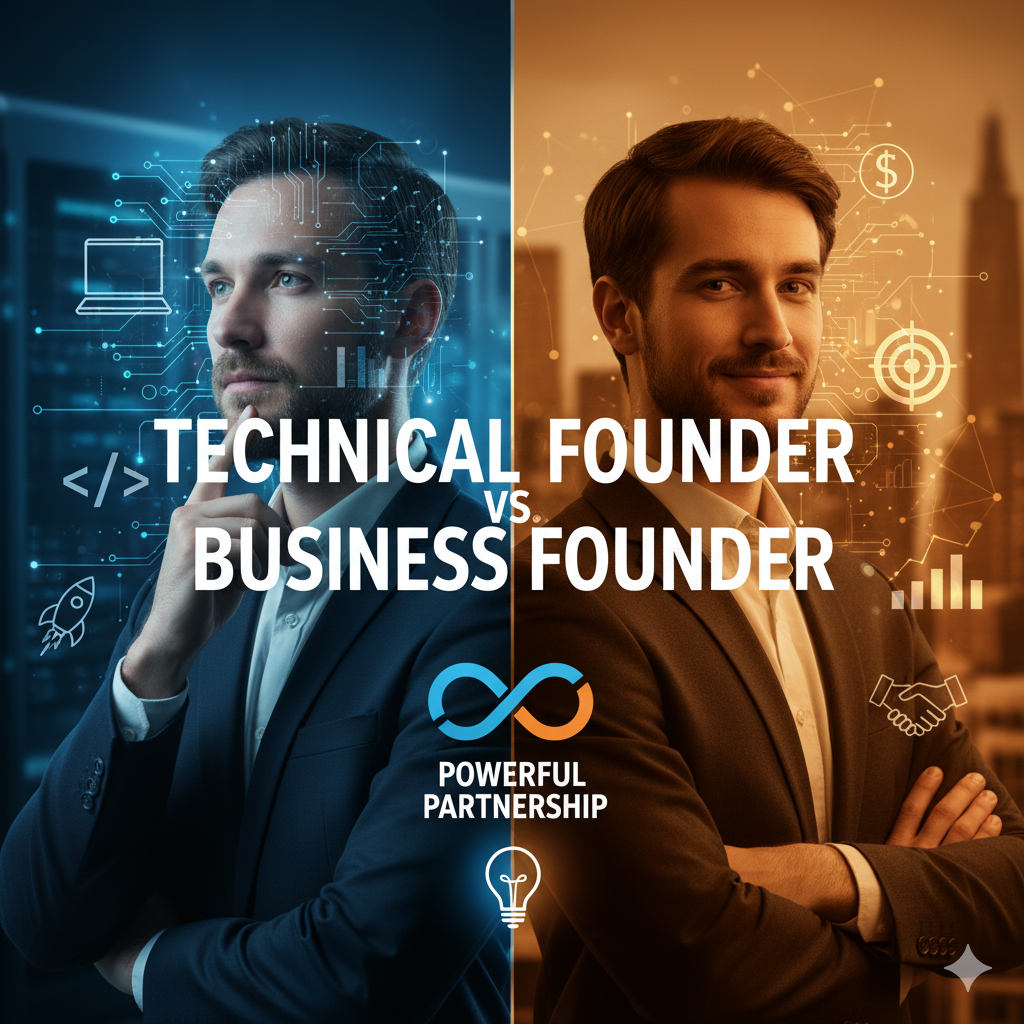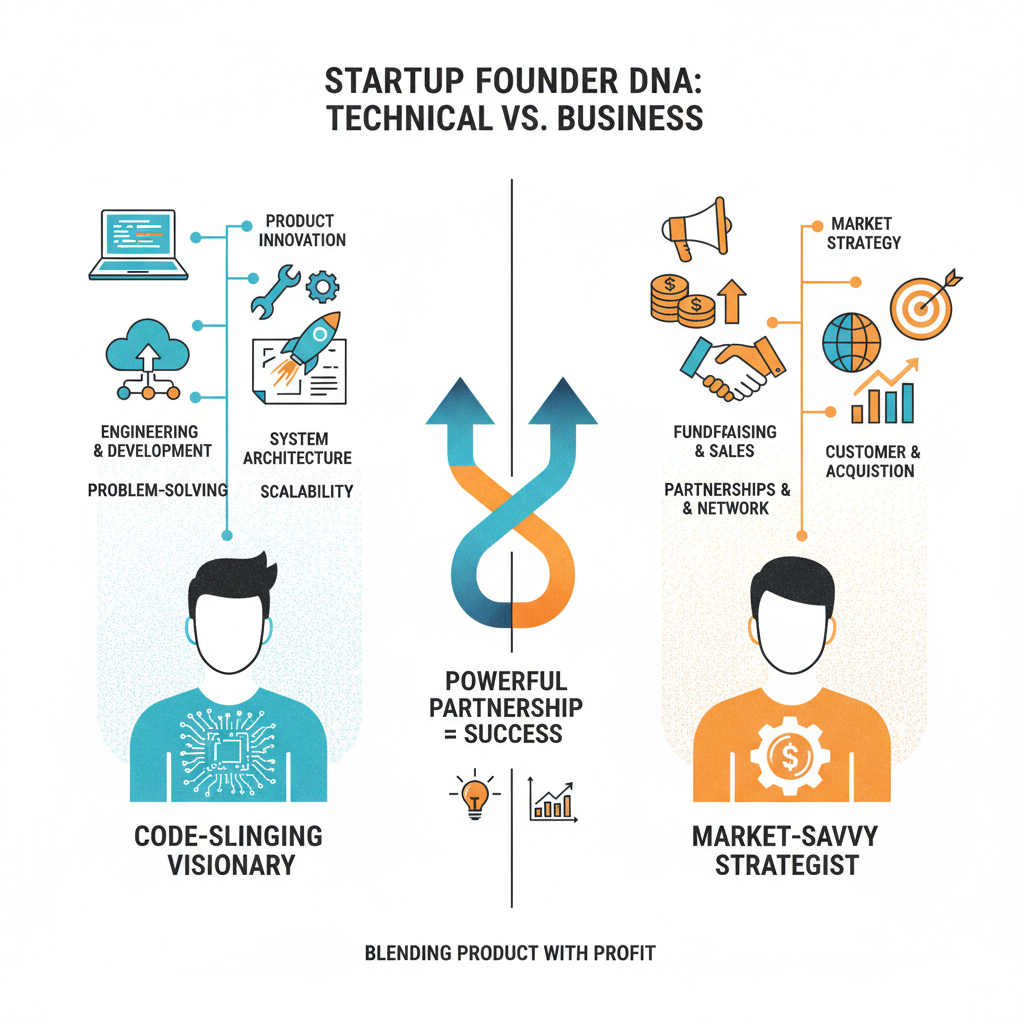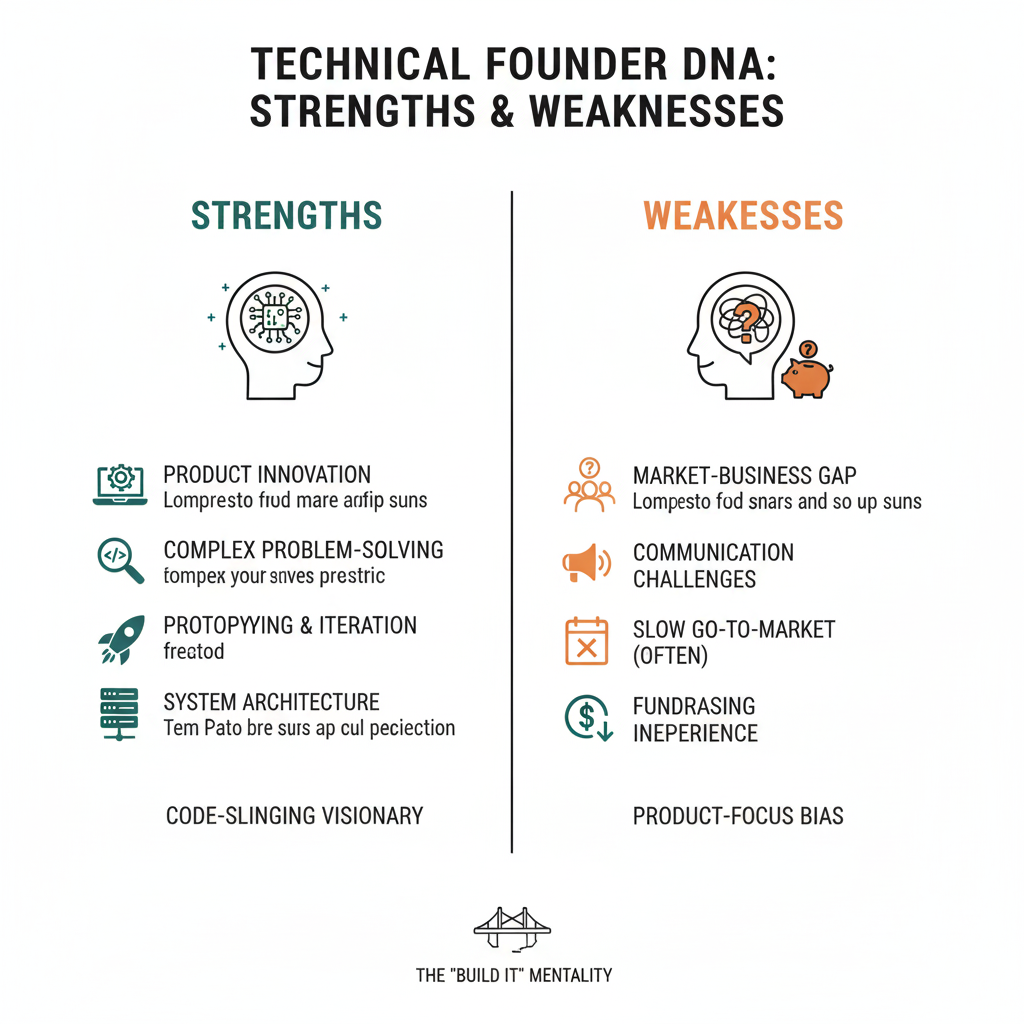
So, you have a billion-dollar idea.
An idea that’s going to change the world, or at least, make a serious dent in the universe.
But an idea, as they say, is just a multiplier of execution. And execution starts with the founders.
This brings us to one of the most debated topics in the startup ecosystem: who do you need more, a technical founder or a business founder?
It’s a question I’ve pondered over countless cups of coffee, both as a founder myself and while advising other startups.
And the truth is, there’s no simple answer. It’s a bit like asking if you need a heart or a brain. You need both to survive, and you certainly need both to thrive.
Let’s dive deep into the world of technical and business founders, and figure out what makes them tick, what their superpowers are, and why the magic truly happens when they join forces.

Videos are added as random thoughts 💭 💭
The Technical Founder: The Architect of Dreams
I’ve always been in awe of technical founders.
They are the builders, the creators, the architects of the digital world.
They’re the ones who can take a fleeting idea, a sketch on a napkin, and turn it into a tangible product that people can use and love.
What is a Technical Founder?
A technical founder is someone with a deep understanding of the technology that underpins the product.
They’re the ones writing the code, designing the architecture, and making the critical technical decisions that will shape the future of the company.
They are often the first CTO, the first lead developer, and the first person to pull an all-nighter to fix a critical bug.
The Superpowers of a Technical Founder
Having a technical founder on your team is like having a secret weapon. Here’s why:
They Can Build Anything (Almost): The most obvious advantage is their ability to build the product. This means you can get a minimum viable product (MVP) off the ground quickly and cost-effectively, without having to outsource to expensive agencies.
Product Vision from the Trenches: Because they are so close to the product, technical founders have a unique and intimate understanding of what’s possible. They can see opportunities and challenges that a non-technical person might miss.

Master of Technical Debt: Technical debt is the implied cost of rework caused by choosing an easy solution now instead of using a better approach that would take longer. A good technical founder knows when to take on technical debt to move fast, and when to pay it down to ensure the long-term health of the product.
They Attract Top Talent: Great engineers want to work with other great engineers. A strong technical founder can be a magnet for top technical talent, helping you build a world-class engineering team.
The Kryptonite of a Technical Founder
But even superheroes have their weaknesses. Here are a few common challenges for technical founders:
The Business Blind Spot: While they can build a great product, they might not know how to sell it. Sales, marketing, finance, and legal can be foreign territory for many technical founders.
The Product-First Trap: Sometimes, technical founders can get so engrossed in the technology that they lose sight of the market. They might build a technically brilliant product that nobody actually needs or wants.
Communication Challenges: Explaining complex technical concepts to non-technical investors, customers, or even business co-founders can be a struggle. This can lead to misunderstandings and misaligned expectations.
The Business Founder: The Visionary Strategist
If the technical founder is the architect, the business founder is the city planner.
They envision the bustling metropolis, understand the flow of traffic, and ensure that the city meets the needs of its inhabitants.
What is a Business Founder?
A business founder is primarily focused on the commercial viability and growth of the startup.
They are the ones identifying market opportunities, crafting the business model, securing funding, and building relationships with customers and partners.
They often take on roles like CEO, head of sales, or marketing lead.
The Superpowers of a Business Founder
Business founders bring a different, yet equally vital, set of skills to the table:
Market Maestro: They have an innate understanding of the market, customer needs, and how to position a product for success. They are constantly thinking about customer acquisition, revenue generation, and sustainable growth.
Fundraising Force: Raising capital is often a full-time job, and business founders excel at it. Their networking skills, ability to articulate a compelling vision, and understanding of financial models are crucial for securing investment.
Strategic Visionary: They are the ones setting the overall direction for the company, ensuring that all efforts are aligned with the long-term goals. They can see the big picture and navigate the competitive landscape.
Team Builder (Non-Tech): While technical founders build the engineering team, business founders are adept at building out sales, marketing, operations, and administrative teams.
The Kryptonite of a Business Founder
Just like their technical counterparts, business founders have their own set of challenges:
The Technical Chasm: A lack of technical understanding can lead to unrealistic expectations about product development timelines, costs, or even what’s technically feasible. This can create friction with the technical team.
Over-Reliance on Outsourcing: Without a technical co-founder, business founders might resort to outsourcing development.
While sometimes necessary, this can be costly, lead to quality issues, and make it harder to iterate quickly.
Credibility Gap (Tech): In a tech-driven startup, a business founder might struggle to gain the full trust and respect of the engineering team or technically-minded investors if they can’t speak the language of technology.
The Dynamic Duo: Why They Need Each Other
The most successful startups often feature a powerful partnership between a technical and a business founder.
It’s not about one being superior to the other; it’s about the synergy they create.
Bridging the Gap
Imagine a bridge.
The technical founder builds one side, focusing on the structural integrity, the materials, and the engineering marvel.
The business founder builds the other side, ensuring it connects to the right roads, serves the needs of the community, and has a toll booth that generates revenue.
Together, they create a complete, functional, and profitable bridge.
Holistic Vision: This partnership allows for a holistic vision, where technical feasibility meets market viability. The product isn’t just cool; it’s also something people want and will pay for.
Balanced Decision-Making: Decisions are made with both technical constraints and market opportunities in mind, preventing common pitfalls like over-engineering a product or building something nobody needs.
Investor Appeal: A balanced founding team is incredibly attractive to investors. It signals that the startup has both the ability to build and the ability to sell, significantly de-risking the investment.
Accelerated Growth: When each founder can focus on their strengths, the company can move faster and more efficiently. The technical founder can innovate, while the business founder can strategize for growth.
The Evolving Role of Founders as a Startup Scales
It’s important to remember that the roles of both technical and business founders are not static.
They evolve significantly as the startup progresses through different stages.
The Technical Founder’s Journey
In the ideation phase, the technical founder is all about rapid prototyping.
Their goal is to quickly build a proof-of-concept, even if it’s just a Figma mock-up or a simple script, to test ideas and gather initial feedback [3].
As the startup moves into building an MVP, the technical founder focuses on launching a functional product swiftly.
This often involves doing things that don’t scale, using hacks, and leveraging third-party tools to achieve an 80/20 solution within weeks [3].
Post-launch, during the iteration phase, the technical founder’s role shifts to continuously improving the product based on user feedback and data.
They balance adding new features with addressing technical debt and fixing bugs [3].
Eventually, as the company achieves product-market fit and scales, the technical founder’s role transforms from a hands-on coder to a leader.
They focus on scaling the technology, building the engineering team, and fostering a strong technical culture.
This often means transitioning into an architect or VP of Engineering role, which can sometimes lead to an
‘identity crisis’ for those who prefer individual contributor roles [3].
The Business Founder’s Evolution
Similarly, the business founder’s journey is one of constant adaptation.
In the early stages, they are the ultimate hustlers, focused on validating the market, acquiring initial customers, and securing early funding.
Their skills in agility and doing whatever it takes are paramount to getting the startup off the ground [4].
As the company scales, the business founder must evolve from a ‘doer to leader, executor to strategist’ [4].
The focus shifts from simply finding product-market fit to building structure, leadership, and scalability within the organization.
They need to think beyond the urgent and anticipate what’s coming next, considering automation, outsourcing, and restructuring for growth [4].
Leading a larger, more complex organization requires a different skill set, emphasizing trust, delegation, and the ability to manage people in areas where they might excel themselves.
Adaptability is key, as many startups fail not due to a bad product or lack of funding, but because of team issues, poor execution, and an inability to scale leadership [4].
Successful business founders learn fast, pivot with purpose, and build a strong company culture that can grow with the business [4].
They understand that long-term trust is built on results, not just hype, and that scaling involves building robust systems, executing with precision, and reinforcing core values [4].
The Solo Founder Dilemma: Can One Person Do It All?
While the dynamic duo of technical and business founders is often hailed as the ideal, what about the solo founder?
Can one person truly embody both roles effectively?
It’s a challenging path, and while not impossible, it significantly increases the burden on a single individual.
A solo technical founder might struggle with the commercial aspects, while a solo business founder might face immense hurdles in product development without a technical counterpart.
As the Y Combinator article suggests, a technical founder can learn business aspects, but the desire and time to do so are critical factors [2].
Conversely, a business founder can learn enough about technology to make informed decisions, but they will always rely on strong technical talent for execution.
Ultimately, the decision to go solo or seek a co-founder depends on the individual’s strengths, weaknesses, and their capacity for rapid learning and adaptation across diverse domains.
However, the data often points to co-founded startups having a higher success rate, largely due to the complementary skill sets and shared burden of the entrepreneurial journey.
Finding Your Other Half: Building the Dream Team
So, if the ideal scenario involves both a technical and a business founder, how do you find your perfect match?
It’s not unlike dating, requiring patience, clear communication, and a shared vision.
Define Your Gaps: Understand your own strengths and weaknesses. Are you a coding wizard who shies away from sales pitches? Or a marketing guru who struggles to understand API documentation?
Look in the Right Places: Technical founders might be found at hackathons, developer conferences, or online communities. Business founders often frequent networking events, industry meetups, and entrepreneurial programs.
Shared Vision, Complementary Skills: The most important aspect is a shared passion for the problem you’re solving and a compatible working style. The skills should be complementary, not identical.
Test the Waters: Before committing to a co-founder relationship, work on a small project together. See how you collaborate, handle disagreements, and celebrate successes.
Conclusion: The Symphony of Startup Success
In the grand symphony of startup success, both the technical founder and the business founder play indispensable roles.
The technical founder composes the intricate melodies and harmonies of the product, ensuring its structural integrity and innovative spirit.
The business founder conducts the orchestra, guiding the performance to reach the widest audience, securing the resources, and ensuring the entire production is a commercial triumph.
Neither can achieve true greatness without the other.
The journey of a startup is fraught with challenges, but a balanced founding team, where technical prowess meets business acumen, is undoubtedly one of the strongest foundations you can build.
It’s about creating a synergy where the whole is greater than the sum of its parts, leading to not just a successful product, but a thriving, scalable business that truly makes an impact.
So, whether you’re a technical genius with an idea or a business visionary looking for your next venture, remember the power of partnership.
Your co-founder isn’t just a colleague; they’re your partner in crime, your confidant, and your co-pilot on the exhilarating flight to startup success.
—
References
[1] Y Combinator. (2024, January 11). *Do technical founders need a business co-founder?* YC Startup Library.
[2] Klenk, M. (2024, August 6). *The role of a technical founder in the different stages of a startup*. LinkedIn. [
[3] R, B. (2025, March 21). *The Evolving Role of a Founder: Lessons from Scaling Startups*. Medium. [
